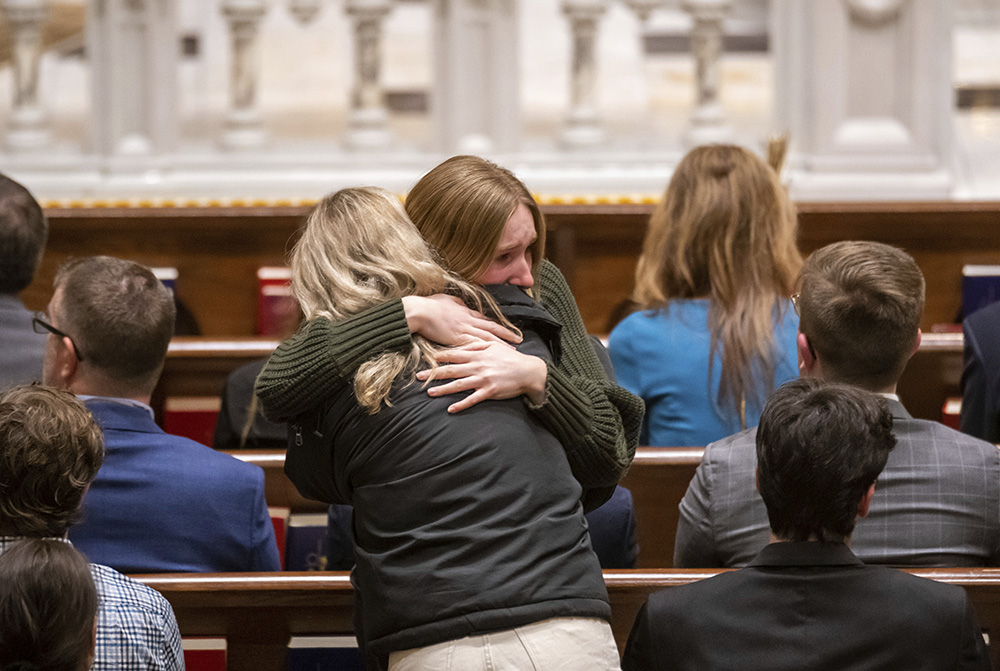
Friends and supporters console each other during a memorial service for Brian Fraser at St. Paul on the Lake Catholic Church in Grosse Pointe Farms, Michigan, Feb. 14. Fraser was identified as one of the students slain during a mass shooting on Michigan State University's campus the night before. (Detroit News via AP, Pool/David Guralnick)
After a deadly shooting at Michigan State University in East Lansing, Catholic campus ministers say they are focused on being present for students and community members.
On the evening of Feb. 13, a shooter killed three MSU students — Brian Fraser, Alexandria Verner and Arielle Anderson — at an academic building and the MSU union, where students eat and study. Five other people were injured and remain in critical condition, according to The Washington Post.
St. Paul on the Lake Catholic Church in Grosse Pointe Farms, Michigan, held a prayer service for Brian Fraser on Feb. 14.
Fraser was also part of the class of 2017 at St. Paul on the Lake Catholic School, where "his light shined bright with love, leadership and kindness in the classroom, athletics and within the St. Paul community," according to a Facebook post from his parish.
While Michigan State University's classes and activities have been canceled for the rest of the week, St. John Church and Student Center, less than a mile's drive from both of the shooting sites, will be open throughout the week.
"My intention is just to be in the office, in the building as much as possible with my door open, ready for anyone who might want me to talk," Fr. Mike Cassar, a vicar at St. John's, told NCR.
The church was open at 8 a.m. on Feb. 14, and all-day Adoration of the Blessed Sacrament began at 10 a.m., he said. Throughout the week, the typical schedule of sacramental activities will continue.
Katie Gleason, director of campus ministry for St. John Church and Student Center, said they have seen "an enormous number of students leave the campus community, [and] go home to their parents."
Advertisement
For the students who remain on campus, some have sought counseling, confession or snacks, she said.
"We've had students right now on campus praying the Divine Mercy chaplet for the souls of those who passed," said Gleason.
Other students, she said, were "chalking the neighborhood letting people know the church is open and people are welcome to just come and pray or have a snack or just be present, have a listening ear."
Beyond the students, community members have come in to offer to serve as counselors or "listening ears" and bring snacks, including a lot of potato chips, Gleason said.
"We've been overwhelmed by the outpouring of support from our parish community, our diocesan community," said Gleason. "We've heard from campus ministries all over the country with words of support and prayers."
Gleason also expressed gratitude to the MSU police and the MSU administration for working closely with the MSU Religious Advisors Association.
When many students return next week, a time when campus ministry normally hosts a large Fat Tuesday party, Gleason anticipates even more grief processing.
"That trauma of the sheltering in place experience, calling moms and dads and being very emotional about safety, seeing parents be emotional about safety. I think that's a trauma that will be affecting most of our students," said Gleason.
Gleason and Cassar both plan to refer students to counseling if necessary. "If anyone has been very close to the scene or has been deeply traumatized by this in some other way, we really want to refer them for professional services because we want people to get the help that they need to heal," said Gleason.
Even so, Cassar isn't sure what long-term healing will look like.
"I don't know what it's like to go to this class in a building where you know somebody was shot in or what it's like to get food in a building where you know that a week or two ago somebody just died on this floor," said Cassar.
"I have no idea what kind of healing you need for that and what you need to process it," he said.
So far, students have still been in preliminary processing phases and haven't asked Cassar any theological questions. But if they do, he said he will point to Matthew 5:4, "Blessed are they who mourn, for they will be comforted."
"We have this strange religion where God got crucified and where God suffered and where God knows what it's like to suffer and to walk with those who are suffering," said Cassar.







